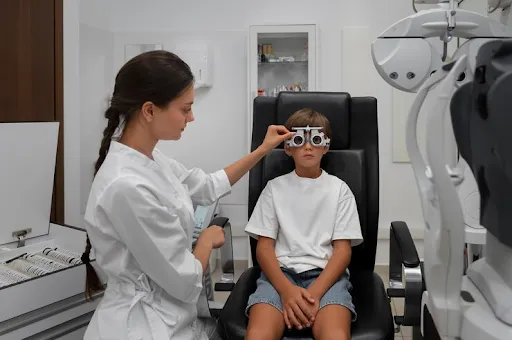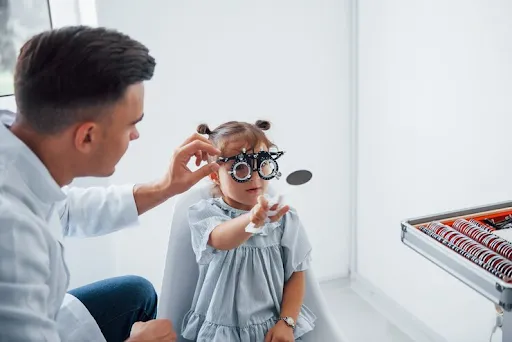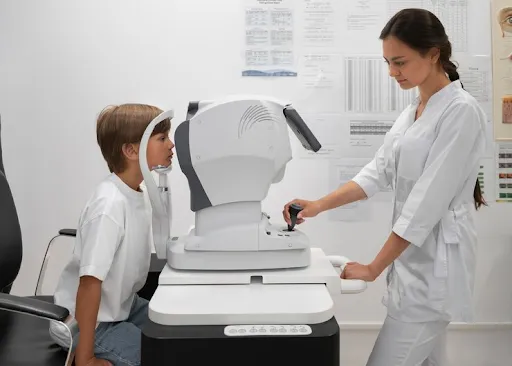Pediatric Vision Care
Early Intervention in Pediatric Vision Problems: Why It Matters
FSDAVCFEBFEVSDDVFSD
FSDAVCFEBFEVSDDVFSD
FSDAVCFEBFEVSDDVFSD
Understanding Pediatric Vision Issues
Detecting vision problems early in children is crucial for effective treatment and preventing long-term complications. Common pediatric eye problems include amblyopia (lazy eye), strabismus (crossed eyes), and refractive errors such as nearsightedness or farsightedness. Early detection of children's vision through regular eye exams allows for timely intervention, which can significantly improve outcomes. Parents should be aware of signs like squinting, difficulty focusing, or frequent eye rubbing as these may indicate underlying issues.
Routine eye care is essential in addressing these conditions before they affect a child’s development and learning abilities. Pediatric eye exams can help identify vision problems early, allowing for corrective measures such as glasses, patches, or vision therapy.
Detecting vision problems early in children is crucial for effective treatment and preventing long-term complications. Common pediatric eye problems include amblyopia (lazy eye), strabismus (crossed eyes), and refractive errors such as nearsightedness or farsightedness. Early detection of children's vision through regular eye exams allows for timely intervention, which can significantly improve outcomes. Parents should be aware of signs like squinting, difficulty focusing, or frequent eye rubbing as these may indicate underlying issues.

Routine eye care is essential in addressing these conditions before they affect a child’s development and learning abilities. Pediatric eye exams can help identify vision problems early, allowing for corrective measures such as glasses, patches, or vision therapy.

Signs of Vision Issues in Kids
Early intervention is critical for managing vision problems in children. Parents should be vigilant for signs such as frequent headaches, difficulty with reading or writing, and complaints of blurry vision. Additional signs of vision issues in kids include poor eye coordination, frequent eye rubbing, and holding books or screens too close. Identifying these symptoms early and addressing them promptly can prevent more severe vision problems and improve a child’s overall quality of life.
Routine eye exams by a pediatric optometrist play a vital role in monitoring and managing vision changes. Regular check-ups help in detecting and addressing issues before they impact a child's development. Our pediatric vision intervention services offer comprehensive care tailored to each child's specific needs. Early treatment can correct vision problems and significantly support a child's educational and social growth.
Ensuring that children receive timely eye care helps in fostering their academic performance and social interactions. By remaining attentive to potential vision problems and seeking professional advice, parents can help their children achieve their best visual health and overall well-being. Early intervention not only improves vision but also supports long-term development and success.
Benefits of Early Eye Care

Early eye care offers numerous benefits, including the prevention of severe vision problems and the promotion of healthy visual development. Addressing issues like lazy eye or eye misalignment early can correct these problems before they impact a child's learning and social skills. Benefits of early eye care include improved academic performance, enhanced sports participation, and a lower risk of developing more serious conditions later in life.
By focusing on early intervention, parents can help their children achieve better overall visual health and well-being.

By addressing vision problems early, children benefit from improved overall eye health and a more positive educational experience. Vision issues, if left untreated, can hinder a child's ability to read, write, and engage in classroom activities. Early detection and intervention ensure that these problems are managed effectively, preventing them from affecting academic performance and daily life. Regular eye check-ups can catch issues such as strabismus or amblyopia before they become more complex, providing timely treatments that support better visual development.
Proactive treatments not only address immediate concerns but also contribute to better long-term outcomes. By staying on top of their child's eye health, parents can help avoid more severe conditions that could impact vision and learning. Regular consultations with a pediatric optometrist ensure that any developing issues are caught and treated early, helping children thrive academically and socially. For more information on the importance of early eye care, visit our page on benefits of early eye care.
Choosing the Right Pediatric Eye Specialist
Selecting the right pediatric eye specialist is crucial for effective vision care. Look for professionals with experience in managing pediatric vision issues and who use advanced diagnostic tools. Choosing the right pediatric eye specialist ensures that your child receives comprehensive and specialized care tailored to their unique needs. A qualified specialist will offer appropriate treatments and provide ongoing support to monitor and adjust as needed.
Early and consistent care from a knowledgeable eye specialist can significantly impact your child’s vision health and overall development. Early detection and intervention are key components in ensuring your child’s visual health is well managed. Addressing vision issues promptly helps prevent them from interfering with learning and social interactions, fostering better academic performance and self-esteem. Regular eye exams and a proactive approach to treatment can support your child's success and well-being throughout their formative years.
Scheduling Regular Eye Exams
Routine eye exams are essential for maintaining good vision and detecting problems early. Scheduling regular appointments ensures that any vision issues are identified and addressed promptly. Regular check-ups can help monitor your child’s eye health and prevent the development of serious conditions. Scheduling regular eye exams is a proactive approach to maintaining optimal vision and overall health.
Early and consistent care from a knowledgeable eye specialist can significantly impact your child’s vision, health and overall development. Early detection and intervention are key components in ensuring your child’s visual health is well managed. By addressing potential issues promptly, you can support your child’s academic success and social interactions, providing them with the tools they need to thrive.
Routine eye exams are essential for maintaining good vision and detecting problems early. Scheduling regular appointments ensures that any vision issues are identified and addressed promptly. Regular check-ups can help monitor your child’s eye health and prevent the development of serious conditions. Scheduling regular eye exams is a proactive approach to maintaining optimal vision and overall health.

Early and consistent care from a knowledgeable eye specialist can significantly impact your child’s vision, health and overall development. Early detection and intervention are key components in ensuring your child’s visual health is well managed. By addressing potential issues promptly, you can support your child’s academic success and social interactions, providing them with the tools they need to thrive.

Supporting Your Child’s Vision Health
Supporting your child's vision health involves more than just routine eye exams. While regular check-ups with an eye care specialist are essential, fostering healthy habits at home plays a significant role in maintaining good eye health. Encouraging proper lighting for reading, limiting screen time, and ensuring a balanced diet rich in vitamins and minerals can all contribute to visual wellness. Establishing these habits early helps create a supportive environment that promotes eye care and prevents potential issues.
Healthy lighting while reading reduces eye strain and supports proper visual development. Limiting screen time is equally important, as excessive use of digital devices can contribute to eye fatigue and digital eye strain. Implementing the 20-20-20 rule—taking a 20-second break to look at something 20 feet away every 20 minutes—can also help alleviate discomfort from prolonged screen use. Additionally, a diet rich in antioxidants, omega-3 fatty acids, and vitamins such as A, C, and E supports overall eye health and can reduce the risk of developing vision problems.
Parents play a crucial role in ensuring their child’s vision is monitored and cared for effectively. By staying vigilant for signs of vision issues and working closely with eye care professionals, you can help implement strategies that support long-term visual health. Regular communication with your child’s optometrist allows for early detection and intervention, addressing any concerns before they develop into more significant problems.
For more information on how to support your child’s vision health and to schedule an eye exam, visit our page on supporting your child’s vision health. Taking a proactive approach ensures that your child receives the care they need for optimal visual development and overall well-being.
Accessing Pediatric Eye Care Resources
Accessing reliable resources for pediatric eye care can provide valuable information and support. Our pediatric eye care resources offer a wealth of information on managing and preventing vision problems in children. These resources are designed to help parents stay informed and make the best decisions for their child's eye health. Regularly engaging with these materials can help you stay proactive in addressing any emerging vision concerns.

Accessing reliable resources for pediatric eye care can provide valuable information and support. Our pediatric eye care resources offer a wealth of information on managing and preventing vision problems in children. These resources are designed to help parents stay informed and make the best decisions for their child's eye health. Regularly engaging with these materials can help you stay proactive in addressing any emerging vision concerns.
Utilize these resources to stay updated on the latest developments and best practices in pediatric vision care. Regularly reviewing this information ensures you are well-equipped to support your child's vision needs effectively. For ongoing guidance and support, check our dedicated pages and resources to make informed decisions about your child’s eye health.
Utilize these resources to stay updated on the latest developments and best practices in pediatric vision care. Regularly reviewing this information ensures you are well-equipped to support your child's vision needs effectively. For ongoing guidance and support, check our dedicated pages and resources to make informed decisions about your child’s eye health.
Contact Us for Expert Advice
If you have concerns about your child’s vision or need guidance on early intervention strategies, our team is here to help. Contact us to schedule an appointment and receive expert advice tailored to your child’s specific needs. Contact us for expert advice to begin addressing any vision issues and ensuring the best possible care for your child.
Our experienced professionals are dedicated to providing high-quality care and support for all pediatric vision concerns. We look forward to assisting you in maintaining your child’s eye health and overall well-being. By working together, we can address any vision issues early and ensure your child’s visual development is on track. Don't hesitate to reach out with any questions or to schedule an appointment. Your child's vision health is our top priority.

Contact Info
Hours of Operation
Mon - Fri | 9:00 AM - 5:00 PM
Sat - Sun | Closed
Holiday Hours: We are closed for the following holidays: New Years Day, Memorial Day, Independence Day, Labor Day, Thanksgiving Day, Christmas Day
© 2026 Kleinwood Vision. All rights Reserved.


